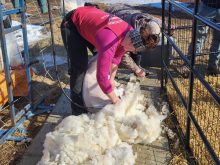NASHVILLE, Tenn. – The National Cattlemen’s Beef Association wants the country-of-origin labelling law
rescinded.
The American cattlemen’s group supports a voluntary COOL program and fears a mandatory law could be too costly.
“We see it as a tax on ourselves. There is a whole lot of cost and no benefit,” said Tom Broderick, president of the Missouri Cattlemen’s Association.
“Everything rolls downhill and obviously it will roll on us,” he said at the NCBA international trade committee session on Jan. 30.
Missouri has the second largest cow herd in the United States. Its producers worry the logistics of country-of-origin labelling, designed to prove their cattle were American born and raised, could be onerous. They also fear retaliation from retailers and packers if their records cannot be verified or are proven false.
Read Also

Charges laid after cattle theft
Saskatchewan RCMP lay two charges against a man after six cattle went missing.
Many producers said they prefer a voluntary program. They also expressed fears that consumers may not wish to pay more for meat for the sake of a label identifying where the animal was born.
The benefits of the labelling bill were intensely debated throughout committee sessions at the NCBA convention Jan. 30-31. It was agreed total consensus is necessary among farm groups when they lobby for change to the bill. Some delegates were not convinced everyone favours rescinding that section of the farm bill.
Montana introduced an amendment to extend the voluntary period from 2004 to 2006 to allow for an adjustment period and corrections to the law. That motion was defeated.
Ernie Morales, a Texas feedlot operator, feeds mostly cattle imported from Mexico. Many of these animals came from American stock.
“To put a label on there and say that is not good enough is self defeating,” he said. “We would be na•ve to believe Mexico, which has become our largest trading partner, would not retaliate.”
Jake Martynek of New York said lobby efforts must start now because by 2004 a new set of politicians may be in power and they may not be easily convinced that a mistake was made.

















